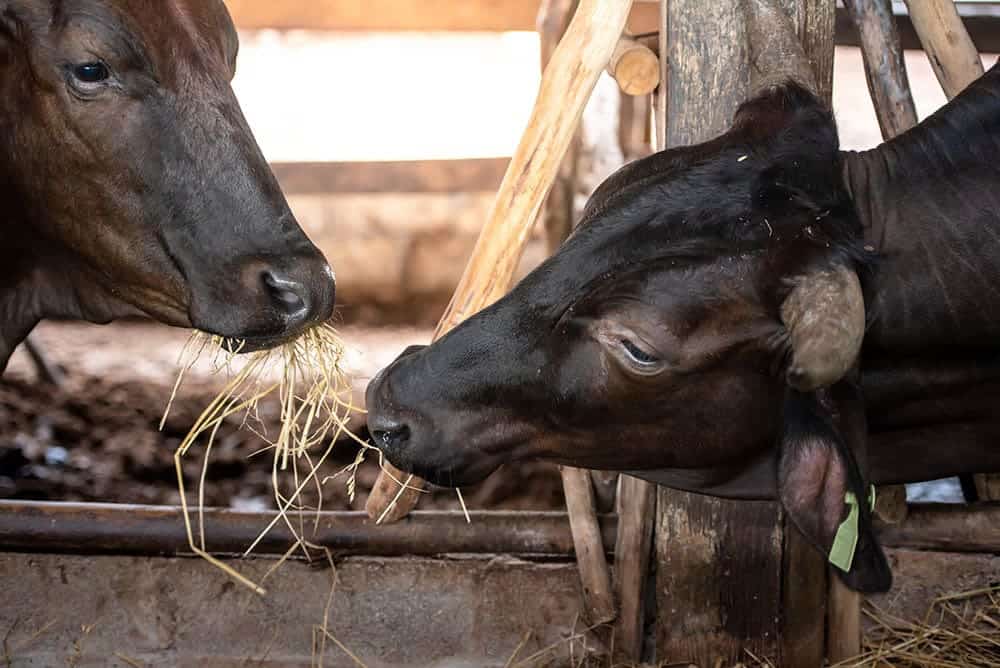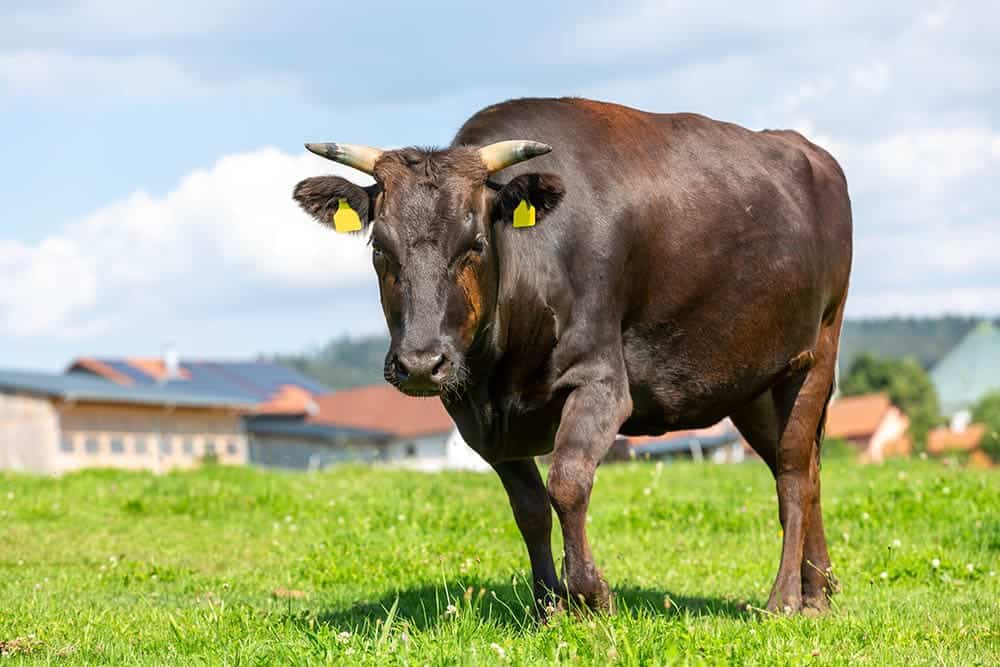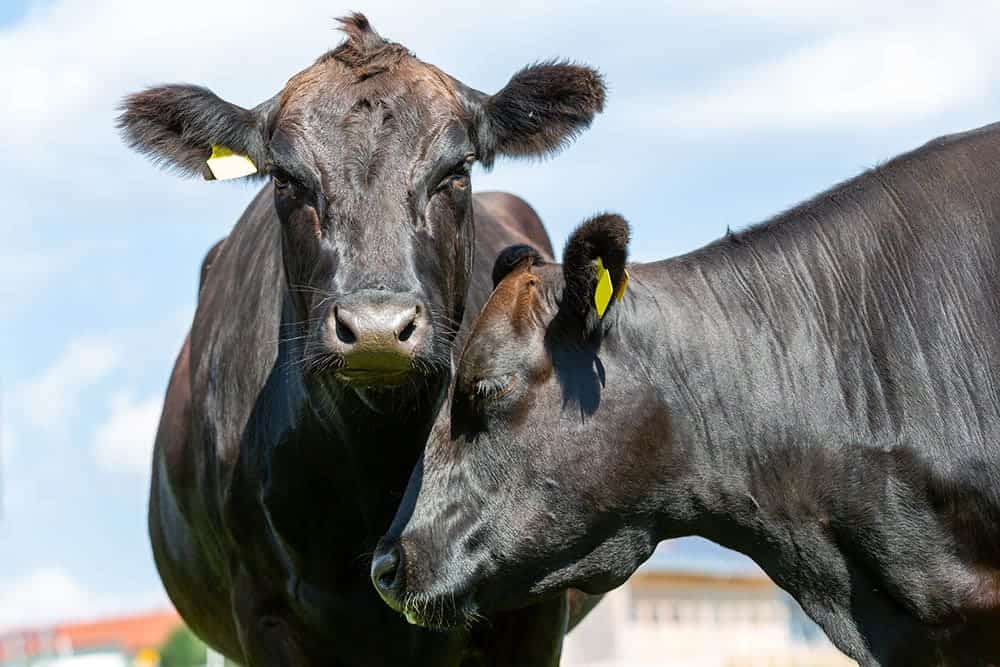With roots in ancient Japan, the Wagyu is a unique breed of beef cattle that has reached worldwide recognition. Wagyu cattle have tender, marbled meat and high fertility, which has made them a great candidate for importation and crossbreeding. Although still rare in the United States, the Wagyu is growing in popularity.

Quick Facts About Wagyu Cattle
| Breed Name: | Wagyu |
| Place of Origin: | Japan |
| Uses: | Meat |
| Bull (Male) Size: | 1,500–1,700 pounds |
| Cow (Female) Size: | 1,200–1,500 pounds |
| Color: | Black, brown |
| Lifespan: | Slaughtered at 30–35 months/Natural lifespan, 15–20 years |
| Climate Tolerance: | Thrive in moderate or hot/humid weather; tolerate cold weather |
| Care Level: | Moderate to high |
| Production: | 500–700 pounds of beef |
Wagyu Cattle Origins
Wagyu is the term for several interrelated breeds of Japanese beef cattle, from the words “Wa,” meaning Japanese, and “Gyu,” which means cattle. Today’s Wagyu cattle are descended from cattle that have been in Japan for almost 2,000 years. In the late 1800s, a few European breeds of cattle, such as Holstein and Angus, were introduced to Japan, where they crossbred with the existing cattle. Today, Wagyu cattle are a distinct breed, and they come in two main types, Black Wagyu (standard) and Red Wagyu. Wagyu cattle today are known for their delicious meat, high fertility, and high value.

Wagyu Cattle Characteristics
Wagyu cattle have black or red coats and slightly forward-curving horns. The bulls weigh about 1,500 pounds, topping out at around 1,700, and the cows average about 1,200 pounds and top out closer to 1,500.
Both red and black Wagyu are known for their fertility and ease of calving. Bulls are extremely fertile and can service 50% more cows than most other breeds. Most cows reach fertility at about 12 months or just before. Wagyu cattle are smaller at birth than most other breeds of cattle, which makes calving easier. Wagyu are slow growers—they usually eat less than other breeds of cattle per day but aren’t slaughtered until they are around 30 months old.
Wagyu meat is known for its tenderness and marbling. Wagyu cattle produce good marbling when fed on grass, feedstock, or a mix of the two.
Uses
Wagyu cattle are known for their high-quality beef. Wagyu beef is considered a delicacy in Japan, and owners of wagyu cows often invest high amounts of care in each cow to increase meat value. It is a waste to factory farm Wagyu!
Wagyu are also highly prized for their cross-breeding potential. Both their high fertility and marbled meat are desirable traits in other breeds. Wagyu cattle have been crossbred with both meat and dairy cattle for these characteristics.
Appearance & Varieties
There are four main varieties of Wagyu: Black, Brown/Red, Shorthorn, and Polled. Japanese Black Wagyu are the most common type both inside and outside of Japan. The Japanese Brown or Red Wagyu is found in Japan and the U.S. as well. It has some lineage from Korean cattle breeds and is known for a slightly lower fat content. The Japanese Shorthorn and Polled varieties are only found in Japan. These varieties have distinctive flavors and are much rarer than the two main varieties of Wagyu.

Distribution
Most Wagyu cattle today are in Japan. About 90% of Wagyu are of the black type, with red Wagyu strains being much rarer. Small populations of Wagyu are raised in the United States and elsewhere. Wagyu are becoming more common in the United States, but they are still a rare breed.
Are Wagyu Cattle Good for Small-Scale Farming?
Wagyu cattle can be a great choice for small-scale farmers, but they are not right for everyone. Wagyu are known for their high-quality meat that requires lots of attention and care. This means that they can be ideal for farmers who only raise a few cattle each year. However, Wagyu calves are more expensive than other cattle breeds. They also are slaughtered at an older age. Wagyu cows are considered easy to breed, but breeding stock won’t come cheap.
If you raise cattle mostly for your own use, consider these factors when buying and decide if the quality is worth the added cost. If you hope to make a profit from Wagyu cattle, it’s important to research the best places to sell high-quality meat so the additional time and money spent are worth it.
Overall, the Japanese Wagyu is an incredible breed with potential that is only just getting recognized in the United States. With their delicious meat, ease of calving, and high fertility rates, these cattle have the potential to become a major breed in the future.
- You may also be interested in: Droughtmaster Cattle
Featured Image by Filmbildfabrik, Shutterstock
